Interview with Mireille Asselin and commentary by Kevin Sullivan of Sullivan Entertainment for “Mozart's Magic Flute Diaries” (2008)
This TV-movie version inspired by Mozart's “The Magic Flute” has an ingenious twist. The traditional opera is intertwined with a contemporary storyline that runs concurrently and involves the same characters with different names from the opera fantasy world. Olivier shines as the goodhearted Papageno and shares some sweet magical scenes with soprano Mireille Asselin in the dual role of Masha/Pamina. Impressive CGI by Sullivan Entertainment convincingly created stunning landscape and architecture mattes for the fantasy fairy tale world and the contemporary storyline.
Interview with Mireille Asselin, soprano
Home Page |
Lorraine:
You've had quite a long operatic association with baritone Olivier Laquerre, on stage with Opera Atelier and other companies. Can you share a few career highlights you experienced together in various productions that you found were especially enchanting, humorous, challenging or professionally gratifying?
Mireille:
I remember so clearly seeing Olivier on stage with Opera Atelier when I was still just a student at the conservatory and being a huge fan of his! I had rarely seen someone run around the stage with such total abandon and he was also incredibly funny and sang beautifully. So when we got to collaborate for the first time I was completely star struck. Luckily he’s the most down to earth and humble person. He put me at ease and treated me as his equal immediately, even though I was incredibly green and not even yet out of school. We’ve worked together many many times since then, especially at Opera Atelier and with the Boston Early Music Festival. One of the most touching moments we’ve shared on stage was during a production of Monteverdi’s “Orfeo” in Boston - I was singing Eurydice and for those who don’t know the myth of Orpheus, she dies on her wedding day and her death is followed by the most incredibly heart wrenching, beautiful laments sung by the chorus. Olivier was tasked with carrying my body across the stage and laying me on the ground, while he joined the other voices in the lament. It was an especially touching and moving moment to share with my friend, and I found it very difficult to stay still and not cry as he sang over me.
Lorraine:
What did you enjoy about working with Olivier especially during the production of “Mozart's Magic Flute Diaries” (2008).
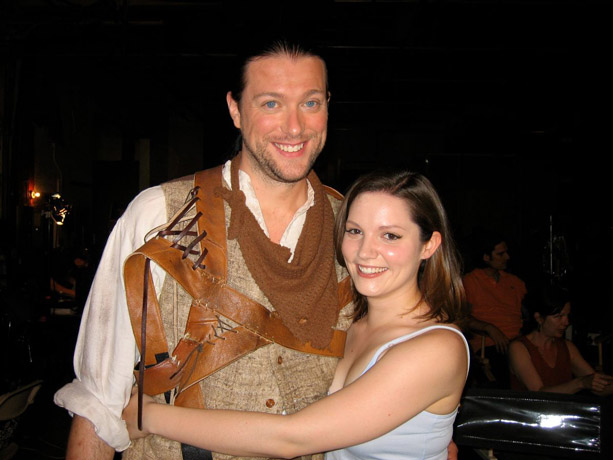
Olivier and I between scenes in 2007 during the filming of “Mozart's Magic Flute Diaries” (2008) (Photo courtesy of Mireille Asselin)
Mireille:
This was our first project together, and I was especially grateful to him as my “ally in opera” during that shoot. All the other actors and tech people on the project were film and tv veterans, and I felt like a fish out of water! He was a great comfort and also so fun loving and ready for anything. I remember filming a sequence where he was climbing up a balcony to come save me, but the balcony set was in fact resting right on the ground and Olivier, great big tall guy that he is, had to crouch down as low as possible while seeming to strain to lift himself up. From my angle I could witness the whole, ridiculous conceit of it, and it was a hard scene to do with a straight face! The film also experimented with a fair bit of green screen techniques, so we had many late nights on set strapped into harnesses and “flying” in the air in front of wind machines. Another strong memory of that time was how enamoured the production and directorial staff were with his blue eyes - eyes made for the screen, they said. :)
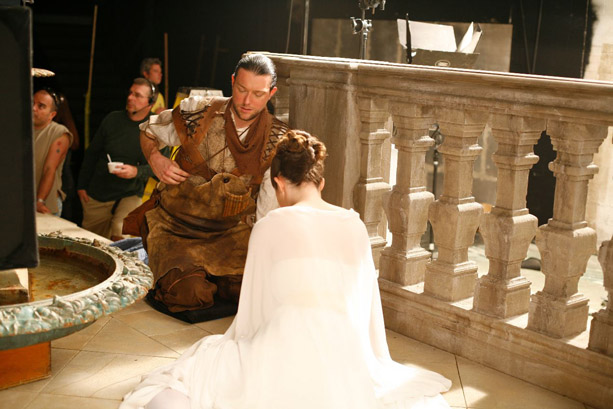
Olivier and I after he had successfully climbed up onto the balcony. (Photo courtesy of Mireille Asselin)
Lorraine:
What was involved in the filming of green screen scenes? How were you directed to act, and did you and Olivier improvise anything? Were there a few memorable moments for you while filming this TV-movie with Olivier? What was your overall impression of the movie while filming – and then seeing the completed movie after?
Mireille:
I don’t remember any specifics of filming particular green screen moments, really. However in general, the thing I found most disorienting and challenging about filming a movie versus doing live theatre or opera is that you feel like your ownership over and control of your performance is out of your hands. The scenes are filmed out of order, so it’s difficult to sense the pacing of the piece or your character’s arc, and most importantly your final performance is decided for you in the editing room. When I finally saw the film it was all a huge surprise, really! Especially since the final edit moved all sorts of scenes around, lots of over-dubbing was added later, etc.. so it didn’t even adhere to the original script we had been working from. I think it was all just so new to me at the time, and I would probably know more about what to expect and how to manage it if ever I got to do something similar again, but I am so glad I had Olivier there with whom to experience it all.
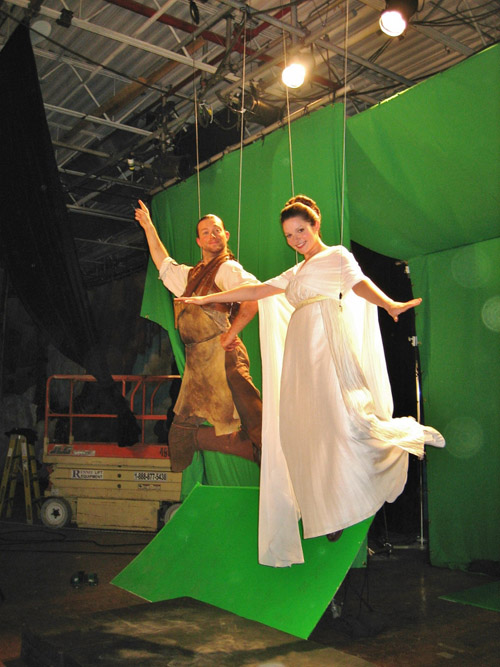
Olivier and Mireille being filmed in front of a “green screen” backdrop. A
realistic CGI location/matte background will be added later during the editing process.
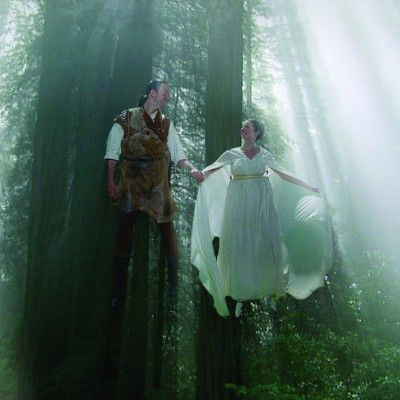
The “forest scene” still depicts Olivier and Mireille as Pamina singing Mozart's 'Man Wife and Wife and Man' after CGI special effects and background have been edited in. Photo courtesy of Kevin Sullivan. Photo © 2007: Sullivan Entertainment
Special commentary by Kevin Sullivan, producer, writer and director of “Mozart's Magic Flute Diaries” and president of Sullivan Entertainment
“The film version of Mozart's classic opera, starring Rutger Hauer, was created almost entirely using CGI technology with all of the filming being done partly on location in Salzburg, Vienna and at Nesuchwanstein in Bavaria, but also on a virtual green-screen set at Sullivan Studios in Toronto.
“The film was made for television for CTV/BellMedia. The impossibility of shooting the entire film in Europe inspired the ingenuity of the film makers to shoot significant scenes in studio. The process allowed the actors, dancers and singer's of Toronto's Opera Atelier company to be filmed on hard sets but also in front of blue and green screens. (In the case of Laquerre and Asselin in the still they were attached on wires and suspended in the air to move through the clouds while singing). In post-production, backgrounds and animation were added to create a virtual environment which allowed Sullivan to recreate Mozart's 18th century fantasy in the same method as similar films of that period such as “Sin City” and “The 300.”
“The technique also allowed for an abundance of creative freedom in depicting modern Salzburg where characters could travel through the picturesque city - from the baroque Landestheater to bustling train stations or hotels and on to vast Austrian palaces and monasteries, as well as imaginative fantasylands within the story of the opera itself; all without ever leaving the Toronto studio.
“The film brings together two diverse art forms, CGI and Opera creating an extraordinary creative synergy.” ~ Kevin Sullivan, Sullivan Entertainment
The movie was released on DVD in 2008 and has definitely stood the test of time, with all its magic moments intact. The unique and remarkable CGI utilizing and combining mattes, special effects and green screen filming holds up well in light of advancements in the technology. The CGI behind the film is featured in an excellent documentary on the DVD, “Filming Mozart's Magic Opera.” In addition to the splendid music and imaginative mounting of the film production as a whole, “Magic Flute Diaries” was superbly cast with opera singers like Olivier and Mireille, and with non-singing actors such as Rutger Hauer as Masha/Pamina's manager, and Warren Christie (whose singing was dubbed) as Tom/Tamino.
Following their involvement in “Mozart's Magic Flute Diaries” Mireille and Olivier have appeared in many other operatic productions together, most recently in Opera Atelier's splendid staging of Mozart's “Don Giovanni” in late 2019. Mireille was cast as Zerlina and Olivier as Masetto.
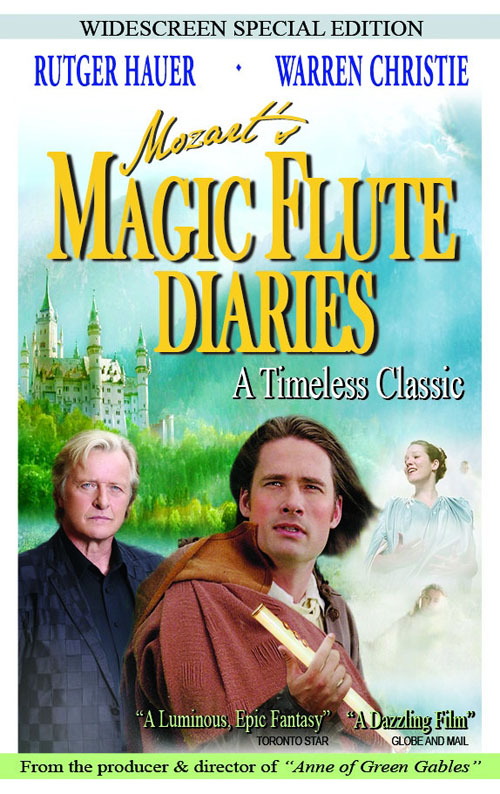
A co-production of Sullivan Entertainment and Opera Atelier, the “Mozart's Magic Flute Diaries” DVD is available from the Sullivan Entertainment shop, and is also available to stream online at www.gazebotv.com